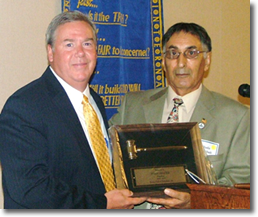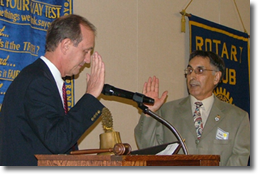Thibodaux Rotary Club – 2011 Installation Banquet
On June 28 at the Envie Restaurant the Rotary Club of Thibodaux installed a new President. Here John Shaver is turning over the gavel to Badi Asrabadi. John thanked Rotary for the opportunity to serve the club and the community.
Badi spoke of the privilege to serve as President for 2011-2012. He has many goals for the year and asked for help from all of the members of the Thibodaux Rotary Club. Together we can accomplish much.
President Badi is sworn in by fellow Rotary Club Member, Louisiana Supreme Court Associate Justice John L. Weimer
Vocational Training Teams Give Kids An Edge
By Dan Nixon
Rotary International News — 2 June 2011
Vocational training teams from Rustenburg, South Africa (District 9400), and Bridgeport, Connecticut, USA (District 7980), have discovered that their communities share surprisingly similar challenges when it comes to early childhood education.
“Both areas face similar hardships of poverty, disintegrating families, poor health, and low parental and childhood literacy,” says Barbara Welles-Nystrom, associate professor of early childhood education at Fairfield University in Connecticut, who led the U.S. team’s visit to South Africa in January. The South African team traveled to the United States in March.
The teams of early childhood educators, both sponsored by Future Vision pilot districts, learned firsthand about the challenges of teaching young children in rural villages near Rustenburg and in urban Bridgeport, and shared best practices in areas including preschool curriculum, facilities, and community support. Funded by a US$35,625 Rotary Foundation Global Grant, the project will also include online teacher training. It supports the basic education and literacy area of focus.
The U.S. team visited seven preschools run by the Royal Bafokeng Institute, which was established by the Royal Bafokeng Nation to support early childhood education in its ethnic homeland.
“With our South African colleagues, we had many exchanges of ideas [on] how to develop better leadership and management of early childhood education programs that will benefit children and their families, including children at risk, so that all children will be better prepared for formal education,” says Welles-Nystrom, a member of the Rotary Club of Fairfield, outside Bridgeport. “We have learned about the challenges facing our colleagues in respect to HIV/AIDS and the difficult situations regarding substandard housing and hygiene, as well as the general poverty of families in the area.”
Your Voice, Your Solution For Promoting Rotary
Rotary International News — 3 June 2011
You have been named the new public relations committee chair for your club. At the 2011 RI Convention in New Orleans, Louisiana, USA, you attended several workshops, including “Making Public Relations Grants Work for You: A PR Grants Clinic” and “Using Social Media to Promote Rotary.” Your head is swimming with new ideas.
Where do you start? What is some of the best advice you gleaned from the convention for promoting Rotary?
Rotary International’s monthly problem-solving forum asks Rotarians for their strategies to address the challenges they deal with every day. Please use the comments section below to share your solutions to this month’s problem. Comments may be used in abbreviated form in other RI publications, including the Rotary E-Learning Center.
Michael Lewis
Michael Lewis with the front office of the New Orleans Saints Organization. He was an enthusiastic speaker particularly working with kids. His big personal goal is for what he is able to do with keeping children on the straight and narrow.
He wants to motivate them to be positive productive citizens. Teaching them to do the right thing and stay out of trouble. He shows them there is a better way than the way of drugs or crime.
He did not play college football, but went on to set records as a running back with the New Orleans Saints. He still holds Saints and NFL records to date. It was not easy to be a walk on with an NFL team. Michael had to work hard and gave up a lot to make his dream a reality. He quit his job as a beer truck driver to play indoor football. It was a big commitment in time, effort and money, or the lack of money. His dream was bigger and his commitment to his goal greater than anything else. After he proved himself as an asset to the Saints, he had gained the nickname as “The Beerman”. Which he did not realize that until he heard an announcer call him The Beerman on the TV. He said ”Wait, that is me, who is he talking about”. Which got a chuckle from the club.
He feels that the story he has to tell is for the kids to have a dream or a goal regardless of how unlikely the goal seems to be.
Louisiana Representative Jerome “Dee” Richard
Representative Jerome “Dee” Richard Spoke to Rotary to update about 2011 legislative session. Obviously, redistricting and Higher Ed funding was a big part of the discussion. The shortfall the state is wrangling with has made it politically charged for where the cuts will happen.
A bill that would raise millions in increased tuition for Nicholls State University and thousands for Fletcher Community College has stalled in the Legislature.
House Bill 448, by Rep. Hollis Downs, R-Ruston, would increase the full-time tuition cap from 12 hours to 15 hours.
Currently, a student who takes 12 hours is considered a full-time student. Any student who is full time pays a flat rate for tuition, even if they take more than 12 hours. Students taking fewer than 12 hours pay per credit hour.
Downs’ bill, which is supported by Commissioner of Higher Education Jim Purcell and Gov. Bobby Jindal, would increase the full-time designation to 15 hours, meaning students taking that number of credits would have to pay more in tuition.
But Rep. Dee Richard, a Thibodaux lawmaker with no party affiliation, says passage of the bill may be doubtful.
“It doesn’t look good for the bill,” he said.
Richard said Downs pulled the bill from the House floor after a bill that would have increased an existing student fee failed by a wide margin.
Dee also spoke about the challenges and political maneuvering which ultimately resulted in splitting Terrebonne and Lafourche. It has been over 150 years that Terrebonne and Lafourche were separate. The last-ditch measure this week to keep Terrebonne and Lafourche parishes in the same congressional district ultimately failed.
Still, it was a good effort by a local lawmaker to keep the state from robbing the local region of its political clout.
State Rep. Damon Baldone, D-Houma, tried one last time to avert the dire consequences that now seem almost certain. Baldone’s bill calling for another go at remapping the local area was shot down in a House committee on Wednesday.
Rather than making up nearly a third of a congressional district as the two parishes do now in the 3rd Congressional District, the northern parts of Terrebonne and Lafourche will comprise about 15 percent of the district focused in Baton Rouge while the southern part of the local area will make up about 12 percent of the district focused in Jefferson and St. Tammany parishes.
Local folks turned out in droves during the public-hearing part of the redistricting process earlier this year, but their pleas for local unity went disregarded.
That means local voters will be relegated to the outlying areas of two faraway districts rather than making up the core of one. The plan that now stands to go into law will deprive us of our political power at the very time when regional approaches to challenges are most in need of a dedicated spokesman and salesman in Congress.
The dual coastal needs of restoration and flood protection demand regional action.
Coastal erosion and the threat of flooding — issues that go to the heart of this region’s continued ability to support this population — threaten all of us.
We cannot help but wonder whether those issues will get the attention they deserve from Metairie and Baton Rouge lawmakers.
Unfortunately, this compelling need, too, will have to compete for attention from congressmen who are unlikely to be familiar with the questions and answers or the people and businesses that rely on them.
Other regional causes such as Nicholls State University and our local population of American Indians will no longer find an automatically interested and sympathetic ear in Washington.
Instead, it looks inevitable that our region will be divided into two congressional districts, separating common interests and hacking apart a powerful voter base.
Excepts from the Daily Comet were used in this article
This Is The History of Thibodaux
This Is The History of Thibodaux
By: Laynie Barrilleaux
Mr. Gibbens Robichaux escorted Rotarians down memory lane as he reminisced about the history of Thibodaux, Louisiana. Mr. Robichaux is a descendent of Henry Skylar who founded Thibodaux in 1796. The city was established primarily because of the water along Bayou Lafourche which was connected to Bayou Terrebonne. The first “establishment” in Thibodaux? A bar, of course!
Mr. Gibbens is credited for writing the E.D. White Alma Mater and founding the Bayou Community Band. He was the full time organist for St. Joseph Co Cathedral for many years and has played for over 1500 funerals and 500 weddings (which, by the way he’ll do for any one of as for free if we get married at the age of 90 or more). Mr. Gibbens shares his love and knowledge of history and daily happenings through a column called TIDBITS.
Here are some other “tidbits” he shared with us about Thibodaux. Governor E.D. White established the town of Thibodauxville in 1830. In 1912 Louisiana entered into the Union. Courthouse records for our city go as far back as 1808. For many years there were no bridges or ferries along the Bayou, but in 1898 the Bayou solid. Mr. Robichaux brought along a copy of a 1938 Comet and read some of the headlines. One of them noted that the Rotary was having Tuesday meetings and that the Rotary was recommending the city install a dial phone system. Telephone numbers were three digit numbers at the time.
City Bakery was established in 1919 and during its three day closing celebration in 1985 it sold over 500 dozen donuts. Thibodaux City Hall had a jail with two cells – and one cell seemed to be inhabited every Saturday night by the same citizen. St. Joseph church burned in 1917 and rumor had it that the Monsignor was responsible because he wanted the church built on another site.
Joe Robichaux was granted the contract to build the cathedral in 1920 for $300,000. Three years, 40 bricklayers and 400,000 bricks later the church was completed and Mr. Robichaux died three weeks later. The gold on the ceiling was painted with a brush by one man – it took 13 months to complete.
The current day Red Goose housed the first post office and there was also a very popular Pavilion where residents went to dance. Only problem – rest room was down by the barges. Mr. Robichaux can still recall the aroma.
Thank you, Mr. Robichaux, for a delightful stroll down memory lane. ~Laynie


